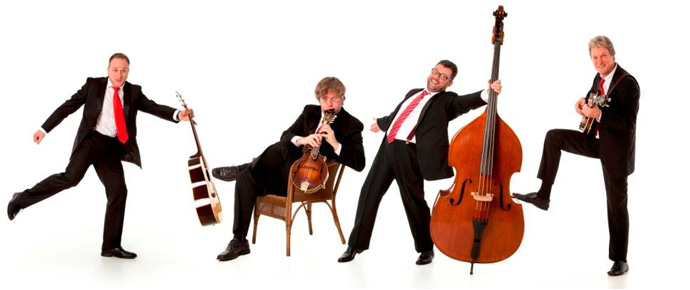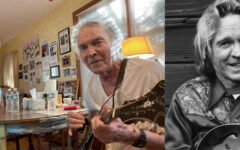
It may seem somewhat surprising that the Sons of Navarone, a Belgian bluegrass band, found the motivation they needed from, well, a Belgian movie. Not just any movie mind you, but one that had the telling title, The Broken Circle Breakdown. Released in 2012, it awoke interest in bluegrass in the band’s native country and helped audiences to fully appreciate the Sons’ sound and style.
“We were asked to participate in a very small way in the movie,” explains Guido Bos, one of the band’s founders. “Before the movie, we always had to explain what bluegrass music was and where in comes from. Since 2012, almost everyone here in Belgium knows what bluegrass music is now.”
However, not all is serendipitous, Bos admits. The group’s appearance in the film lasted no more than a couple of seconds, and he says that Belgian bluegrass concerts are still rather scarce.
Nevertheless, the band has made a formidable impression all on its own. Given the Audience Popularity Award at the European World Of Bluegrass festival in 2016, and named Best European Bluegrass Band at the 2012 La Roches Foron Bluegrass Festival, these three Belgians and one Dutchman have become favorites throughout Europe for the better part of the past two decades, thanks to regular appearances throughout England, The Netherlands, Germany, Switzerland, France, Denmark, and Sweden, as well as continuing high praises from the press. Specializing in tight knit harmonies and anchored by the usual instrumental regalia — banjo, guitar, mandolin and double bass — they take their cues from both vintage standards and contemporary classics.
Granted, the band boasts an unlikely handle. “We wanted a band name that was not related to bluegrass at all, so we were looking for something neutral,” Bos explains. “At a rehearsal, one of the band members suddenly mentioned that he watched the movie, The Guns of Navarone, recently. During the conversation, someone used the word Sons instead of Guns, and then the name was there. From that moment we were the ‘Sons.’”
The band — currently consisting of Bos (double bass/vocals), Thierry Schoysmans (mandolin/banjo/vocals), Yves Aerts (guitar/vocals), and Paul Van Vlodrop (banjo/mandolin/guitar/vocals) — all accrued an interest in music from early on and have turned that fondness and finesse into a tightly tuned ensemble.
“Every band member probably has his own heroes,” Bos suggests. “We’ve been listening to people like Bill Monroe, Flatt & Scruggs, and Jimmy Martin, as well as Tony Rice and David Grisman. It is actually an unlimited list of musicians we listen to — European and local bands as well.”
The group came together in 2001. Asked about their impetus, Bos offers a very succinct answer.
“Because we liked it, I guess,” he replied.
Apparently their audiences concur.
“People have always been very enthusiastic when they see us perform,” Bos insists.
“The Sons always play with a new twist, supplemented with great instrumental virtuosity,” he continues. We play the usual bluegrass instruments, smartly dressed, filled with humor, singing and playing around the traditional technique of a single microphone. Those are the trademarks that have delighted audiences everywhere.”
Aside from their extensive European touring, the band have released two albums, albeit they’ve been several years apart. Their debut effort, aptly titled At Last, appeared in 2009. The pressing was completely sold out. Their most recent effort, 2017’s Nobody’s Business, featured liner notes by renowned mandolin player Mike Marshall.
“Mike married a German woman, Caterina Lichtenberg, a classical mandolin teacher and performer, a couple of years ago, and he lives now partly in Germany and partly in the U.S.A. with his wife and two daughters,” Bos explains. “As the bluegrass world is rather small, we see him now and then at festivals and concerts in Europe, and during various workshops he gives. So we asked Mike if he was interested in doing the liner notes for our last album. I think he liked what we are doing, so after listening to it, he agreed.”
That appears to be an understatement. Marshall not only liked what he heard, but was in fact outrightly enthusiastic as this except indicates.
“The Sons of Navarone speak to one of my personal beliefs about music making,” Marshall wrote. “That this truly is a Universal Art Form and it can shine just as brightly outside of its place of origin as it can from the music’s birthplace. Both natives and non-natives can be as important to the continuation of a musical style and can have a contributing voice within the tradition and to the future of the music. Sons of Navarone are one of the many proofs of that.”
Indeed, that would seem to say it all.







